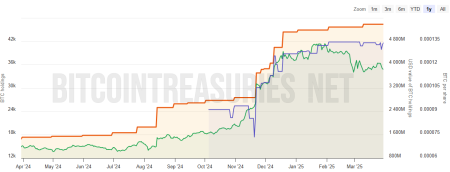Last updated:
 Why Trust Cryptonews
Why Trust Cryptonews
Ad Disclosure
We believe in full transparency with our readers. Some of our content includes affiliate links, and we may earn a commission through these partnerships.

Crypto exchange regulations are “distorting” and rendering the Argentinian sector “inefficient,” an influential Bitcoin-promoting NGO has claimed.
Bitcoin Argentina, one of the nation’s top pro-crypto pressure groups, made its claims in an official statement published on December 4.
The NGO claimed that the National Securities Commission (CNV)’s move to force all crypto exchanges in the company to register and share client data runs counter to the policies of the “libertarian” President Javier Milei.
Crypto Exchange Regulations Hurt Argentina’s Cause, NGO Claims
Earlier this year, the CNV began policing exchanges for the first time, requiring them to adhere to the kind of regulations now commonplace in Western Europe, North America, Japan, and South Korea.
However, Bitcoin Argentina said that the CNV’s new registry system is bringing “distortions and inefficiencies” to the crypto sector.
The NGO said the regulator should scrap its policies and “limit its scope” to fighting “money laundering.”
The CNV has committed itself to creating the registry, with all “digital asset service providers (PSAVs)” obliged to apply for operating permits.
However, the NGO claims that the regulator is trying to fix non-existent issues “in a sector that currently operates without problems.”
“The current system is not a far-off, uncertain, or new market. It is not a sector in crisis or emergency. It is an existing one. And it works well. While the new rules will benefit some players in the ecosystem, they will stifle the growth of others. And it will do nothing to prevent the emergence of future scams.”
Bitcoin Argentina
And Bitcoin Argentina went a step further, claiming that the rules also “pose a risk for the CNV itself” and for crypto traders in the country.
The NGO explained that this was due to the fact that it fails to “provide greater security tools” and “will even create a false sense of security and supervision.”
Essentially granting firms the CNV “seal of approval” in “a market that is eminently risky, asymmetric, global, and unmanageable” would be a major risk, it said.
“Argentina has a unique opportunity to commit to deregulation and maintain the freedom that has yielded such good results so far. We could model that for the rest of the world.”
Ricardo Mihura, Bitcoin Argentina President
‘A Burden for Smaller Businesses’
The NGO’s President Ricardo Mihura said he “cannot understand how the CNV” had chosen to “deviate from the government’s deregulatory approach and propose an inefficient regulatory burden.”
The NGO also warned of “immediate consequences” for “small businesses and self-employed workers,” who would be “forced out of the sector or dragged into illegality.”
“Regulatory costs” could also cripple “new” Argentinian crypto projects in the future, Mihura noted.
And Rodrigo Andragnes, the NGRO’s founder claimed that the CNV should “take the necessary technical time to analyze whether regulating PSAVs really adds value to the community.”
Crypto adoption has rocketed in Argentina in recent years, with stablecoin and Bitcoin buying on the rise.
IMF Role?
Most think the CNV’s crypto exchange regulations were intended as a gesture of good faith to the Intentional Monetary Fund, which has previously expressed concerns about the nation’s lack of crypto regulation.
However, the media outlet c5n noted that the new registry system has sparked “criticism within the cryptocurrency community.”
Some have even “questioned the position of President Milei” for “allowing such regulation.”
Milei has previously spoken in favor of Bitcoin. And the CNV has also held several BTC adoption-themed meetings with its counterparts in El Salvador.
It has also hinted at its softening stance on crypto by attending local crypto summits.
Earlier this year, Vice President Victoria Villarruel held BTC-themed talks with El Salvador’s head of state Nayib Bukele.




